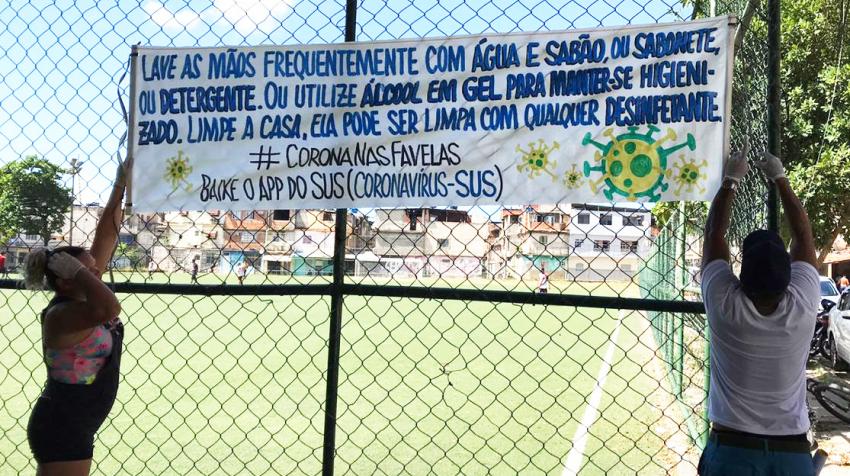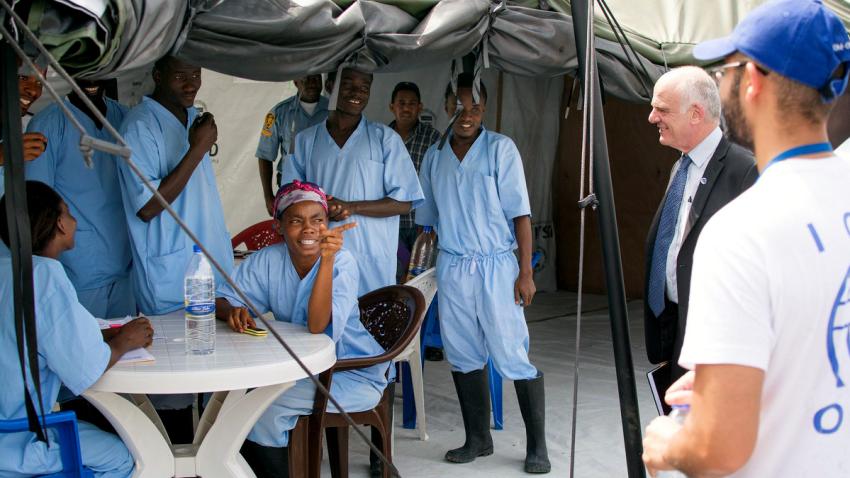Gizele Martins was born and raised in the Complexo da Maré, a group of 16 favelas (slums) with around 140,000 inhabitants in Rio de Janeiro. A journalist and community activist, she helped to create the Mare Mobilization Front to prepare for the arrival of the new coronavirus.
Her mission is to distribute information based on the recommendations from the Ministry of Health of Brazil, the World Health Organization (WHO) and Oswaldo Cruz Foundation (FIOCRUZ) about the care and risks of the new coronavirus, in a broad and effective manner to the poor living in difficult conditions in the favelas.
Today the Front counts on the participation of and support from residents living in the various favelas of the complex. The biggest challenge is that not all of them have access to information from the news media or even the internet.
"We are working with loudspeakers broadcasting from vehicles, and flyers posted in churches, associations and businesses throughout the Maré favelas. We are also creating street art, banners and producing videos, articles and images," explains Gizele.

LEFT: Gizele Martins, founder of Mare Mobilization Front.
RIGHT: A mural painted in the favela reminders residents that the numbers of those who have been infected or died of coronavirus don’t lie. Photos courtesy Mare Mobilization Front
In an interview with the United Nations Information Centre for Brazil, (UNIC Rio), she says that one of the greatest obstacles they face is maintaining social distance. The conditions of life in the favelas-lack of basic sanitation; a shortage of drinking water; and very small, suffocated, overcrowded houses that are built very close to each other - are the main challenges in preventing the spread of COVID-19.
The concern for survival also influences the peoples’ decision to stay at home.
"Most residents are informal workers. People work to eat, which also forces many people out of their homes to try to keep their small businesses going, which means they put themselves at risk," she says.
To help residents, the Maré Mobilization Front is also supervising and organizing the distribution of food and hygiene donations to the most vulnerable people living in the Maré.
According to a survey by Data favela, a partnership between the Instituto Locomotiva and the Central Única das Favelas (Cufa), 72% of favela residents in Brazil will run out of money in just one week of social isolation.
Solidarity: help thy neighbor
Gizele says that people are heeding the call for solidarity made by the Director General of the World Health Organization (WHO), Dr. Tedros Adhanom. "It is a time to think not only of oneself, and how social isolation is affecting each person, it is a time to think of the group collectively, of oneself and the other," reflected the activist.
"Not everyone in the favela has water, so we reinforce the message that the population should wash their hands and that it is more important now than ever for us to share our water with our neighbor who doesn't have access to it", Gizele said.
Hygiene is essential to combat COVID-19. WHO recommends washing one’s hands with soap and water or with alcohol-based hand disinfectants regularly; when coughing or sneezing, cover one’s mouth and nose with a flexed elbow or tissue - then throw away the tissue and sanitize the hands; it is necessary to keep at least one meter away from people who are coughing or sneezing; and if a person has a fever, dry cough and difficulty breathing, it is important to seek medical attention as soon as possible.
Stronger together: allies and partners
An important ally in the fight against the new coronavirus in the Complexo da Maré is the Oswaldo Cruz Foundation (FIOCRUZ), which launched together with the NGO Redes da Maré and community organizations a multimedia campaign titled, "Se Liga No Corona" (Beware of Corona). The initiative aims to disseminate reliable information throughout the complex of favelas, adapted to the context in these communities on the margins of the city.

A campaign poster in the favela encourages residents to pay attention to the common symptoms of COVID-19. Photo courtesy Mare Mobilization Front
Posters, audio messages, radio soap operas, images and videos for social media are the main materials produced by the campaign. These materials are distributed in the busiest areas of these communities, from loud speakers and community radios, in commercial establishments, at bus and motor-taxi stops, neighborhood associations, and also by sharing online.
Fiocruz, a neighbor of the Maré slum complex, was recently honoured for its scientific achievements when WHO appointed its Respiratory and Measles Virus Laboratory as the Reference Laboratory for COVID-19 in the Americas. They conduct genetic and evolutionary studies aimed at the development of vaccines and treatments, supporting laboratories in the region. The Foundation is also a partner of the Pan American Health Organization (PAHO) and WHO in implementing the guidelines and protective measures of the UN organizations in combating the new coronavirus.
The Social Territories Program, implemented by the Pereira Passos Institute in partnership with the United Nations Programme for Human Settlements (UN-HABITAT), aims to reduce the risk posed to vulnerable families living in Rio's ten large slum complexes.
The project, implemented by the municipality of Rio de Janeiro in partnership with UN-HABITAT, identifies people who are extremely vulnerable in the capital of the state of Rio de Janeiro and directs them to public services or cash transfer programmes. In the midst of the COVID-19 pandemic, the search for these people, previously made in person, is now conducted by telephone. More than 1,600 calls have been made to date.




